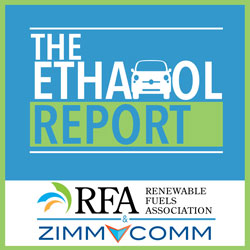 The Environmental Protection Agency released its proposal for 2019 biofuel obligations under the Renewable Fuel Standard (RFS) Tuesday, maintaining the statutory level for corn ethanol while increasing advanced biofuels, but failing to address the small refinery exemptions that have decimated demand and effectively lowered the required amount of biofuels to be blended.
The Environmental Protection Agency released its proposal for 2019 biofuel obligations under the Renewable Fuel Standard (RFS) Tuesday, maintaining the statutory level for corn ethanol while increasing advanced biofuels, but failing to address the small refinery exemptions that have decimated demand and effectively lowered the required amount of biofuels to be blended.
Under the proposed rule, conventional renewable fuel volumes would be maintained at the implied 15-billion gallon target set by Congress for 2019, the advanced biofuel standard would be increased by almost 600 million gallons over the 2018 standard – including an increase of 100 million gallons for the cellulosic biofuel standard and a 330 million gallon increase for the biomass-based diesel standard for 2020.
EPA is also “taking comment on a host of ways to improve market transparency, including by limiting who can participate in the Renewable Identification Number (RIN) market and the length of time a RIN can be held.”
The biofuels industry would be more pleased with the rule if it had addressed the gallons lost due to refinery waivers.
National Biodiesel Board VP of Federal Affairs Kurt Kovarik – “We welcome the Administration’s proposal to grow the biodiesel volumes, following two flatlined years. This is a positive signal for our industry and we’re pleased the EPA has acknowledged our ability to produce higher volumes…The fact remains, though, instability in the RFS program caused by the EPA has done significant damage that can only be rectified for biodiesel through consistent and predictable growth in volumes.”
American Coalition for Ethanol CEO Brian Jennings – “While EPA says it is proposing to maintain the 15-billion-gallon conventional blending target for 2019, in reality Administrator Pruitt’s ongoing actions will reduce ethanol blending far below 15 billion gallons…The proposal to modestly increase cellulosic and advanced RVOs for 2019 is welcome but EPA’s waivers and exemptions have collapsed RIN prices across-the-board discouraging investment in the production and use of cellulosic and advanced biofuels.
Growth Energy CEO Emily Skor – “The EPA proposed 15 billion gallons for conventional biofuels, but that still isn’t a real number we can count on. This plan fails to ensure those gallons will, in fact, be blended. By neglecting to reallocate gallons lost to waivers, the EPA is doubling down on another year of an estimated 1.5 billion gallons in demand destruction…The EPA cannot continue to enrich the largest oil companies and refiners at the expense of struggling U.S. farmers.”
Renewable Fuels Association CEO Bob Dinneen – “The proposal means nothing until EPA reallocates those lost gallons and sets forth a more transparent and rational process that assures small refinery waivers are not abused or granted unnecessarily. Unfortunately, over the past few days, Administrator Pruitt buckled yet again to pressure from the oil industry and removed language from this proposal that would have indicated the Agency’s interest in addressing what has clearly become an abused process.”
 Ethanol production has become a key market for U.S. corn, but margins are often tight. New technology would allow existing ethanol plants to convert a part of their production into making plant-based chemicals that have higher values, with profits that could be passed along to corn growers.
Ethanol production has become a key market for U.S. corn, but margins are often tight. New technology would allow existing ethanol plants to convert a part of their production into making plant-based chemicals that have higher values, with profits that could be passed along to corn growers.










